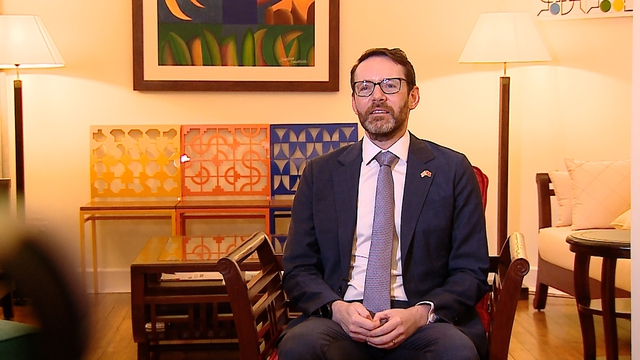Party chief To Lam’s upcoming visit to lift Viet Nam-UK relations to higher level: Ambassador Iain Frew
VGP - Viet Nam and the UK are expected to lift the bilateral relations to a new level during General Secretary To Lam’s upcoming official visit to the European nation, noted British Ambassador Iain Frew.

British Ambassador to Viet Nam Iain Frew - Photo: VGP
In his recent interview with the VGP, the Ambassador highlighted the significance of the top Vietnamese leader's visit, marking the first such visit in 13 years.
The visit not only reflects strategic trust between the two countries but also opens up concrete directions for cooperation, he underlined.
According to Ambassador Frew, during the visit, discussions will focus on key areas such as technology, artificial intelligence, semiconductors, clean energy, and the development of an international financial center in Ho Chi Minh City and Da Nang.
He added that both countries' leaders will also explore ways to enhance partnership in education and skills training to prepare the future workforce, as well as to strengthen initiatives in energy and green transition sectors.
Clear evidence of broad and substantive UK–Viet Nam cooperation
The Ambassador expressed his delight at the bilateral cooperation across many fields, including trade, finance, education, security and climate adaptation.
He noted that in the past decade, bilateral merchandise trade has nearly tripled, reaching more than £9 billion per annum—a sign of deep and substantive collaboration between the two nations.
The UK's accession to the Comprehensive and Progressive Agreement for Trans‑Pacific Partnership (CPTPP), with the support of Viet Nam, represents a major milestone, opening up opportunities for enterprises, institutions and individuals in both countries, thereby providing impetus for sustainable growth and investment.
On education cooperation, over the past 15 years, more than 75,000 Vietnamese students have studied in the UK and currently approximately 12,000 Vietnamese students are enrolled there each year.
It is not merely a process of acquiring knowledge or language skills, but also an opportunity to build "bridges connecting people" between the two countries, he reiterated.
The diplomat also commended Viet Nam's efforts to establish English as a second language throughout its national education system, with many British educational organizations actively supporting this initiative, which will enable young Vietnamese to integrate more fully into the international community.
In addition, the Ambassador pointed out that UK-Viet Nam university partnerships — for example, courses offered by the University of London and other leading British universities in Viet Nam — are allowing students to access high-quality education without travelling overseas.
Regarding climate cooperation and green transition, Frew described these as among the most outstanding areas of partnership, referring to Viet Nam's historic commitment at COP26 to reach net-zero emissions by 2050, and said that the UK and Viet Nam have been cooperating closely under the Just Energy Transition Partnership (JETP).
He noted that a UK energy delegation is currently present in Viet Nam to support the development of the offshore wind sector — an area where the UK has substantial practical experience, adding that cooperation in green transition will contribute to a fundamental restructuring of Viet Nam's energy sector.
In the domain of defense and security, Frew said that the UK is proud to accompany Viet Nam in UN peace-keeping activities as well as in the process of modernizing and diversifying Viet Nam's defense industry.
He pointed out that whereas security-defense cooperation would have been unthinkable twenty years ago, today it has become a pillar of bilateral relations, contributing to both regional and global security.
Viet Nam's economic development among most impressive success stories globally
Regarding Viet Nam's economic development trajectory, the Ambassador described it as "one of the most impressive success stories globally."
The nation has risen from a low-income country to a middle-income one, with millions of people lifted out of poverty-achievements, told the diplomat, hailing the persistent efforts and long-term vision of the Vietnamese Government and people.
He remarked that Viet Nam now enjoys many advantages for the next phase of growth, including a young, well-educated population, favorable strategic location, dynamic manufacturing sector, and a broad network of free-trade agreements.
However, he also urged the nation to continue raising value added in manufacturing, attracting investment into advanced technology, and developing high-quality human resources.
He commended recent Vietnamese policy directions, including Resolution 57 on innovation and Resolution 68 which reaffirms the role of the private sector in the economy, expressing his confidence that with this vision and strong international cooperation, Viet Nam is fully capable of achieving the goal of becoming a high-income developed country by 2045./.
